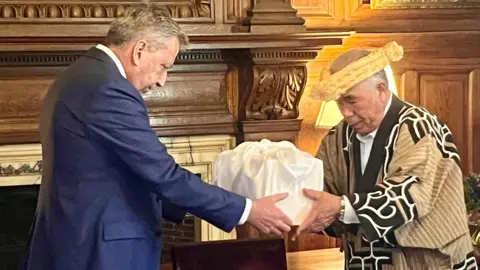Edinburgh University recently made a significant step in recognizing the cultural heritage of indigenous communities by returning three indigenous skulls to Japan. These skulls, originally taken from the Ainu people in Hokkaido, were brought to Edinburgh University in 1913 by Scottish anthropologist Dr. Neil Gordon Munro. The repatriation ceremony, held at the university, marked a poignant acknowledgment of the Ainu community’s history and the importance of their ancestral remains.
The Ainu people have historically faced numerous challenges, including the erasure of their cultural practices under Japanese rule. Dr. Munro’s connection to the Ainu was profound; during his studies, he not only researched their culture but lived amongst them in Hokkaido, developing a deep respect and affinity for their way of life. His contributions to anthropology included sending back thousands of artifacts, human remains, and materials that were significant to Ainu heritage.
During the recent ceremony in Edinburgh, the skulls were returned to Masaru Okawa, executive director of the Hokkaido Ainu Association, in a traditional Ainu ritual. This act was accompanied by plans to inter the skulls at a memorial site within the Upopoy National Ainu Museum and Park, located in Shiraoi, Hokkaido. Okawa expressed gratitude for the return, stating that the ancestors of the Ainu community, who had spent many years in foreign lands, would be pleased to find their way back home. He emphasized the cultural importance of treating these remnants with dignity and respect as part of honoring their spirits.
Dr. Munro’s story and his work are a central part of this historical narrative. He not only graduated from Edinburgh University’s medical school but later became the director of Yokohama Juzen Hospital in Japan. His empathetic understanding of the Ainu plight was recognized by those in the community; a PhD student, Nathan Sydenham, highlighted how Dr. Munro observed parallels between the Ainu’s struggles and the broader context of colonialism under British imperialism. Sydenham noted, “Dr. Munro had a real affinity with them. The Ainu were starting to lose their traditions and values. He was annoyed about that.”
Today, the Ainu language is classified as “critically endangered” by UNESCO, with only a handful of fluent speakers remaining. The ongoing efforts to preserve their culture are met with challenges, but the return of the skulls represents an important milestone in the reconciliation process between indigenous communities and institutions that have historically held artifacts and remains belonging to them.
The university’s initiative to return the skulls reflects a growing recognition of the ethical responsibilities institutions hold regarding historical collections. Prof. Tom Gillingwater, Edinburgh University’s chairman of anatomy, commented that such repatriations should not be viewed as a diminishment but rather as a chance for the university to build new relationships with communities around the world. In 2023, Edinburgh University also returned the skulls of four Mudan warriors to Taiwan, indicating a broader trend towards addressing the injustices of the past.
The return of the Ainu remains to Japan symbolizes a crucial step towards acknowledging historical wrongs and fostering cultural revival among indigenous groups. It highlights the importance of respectful memorialization and honoring ancestors’ spirits, thus allowing communities to reclaim their histories and traditions. With continued efforts like this, the hope is to revitalize Ainu culture and prevent further loss of their heritage.



